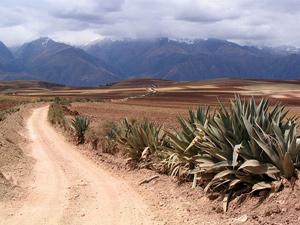Traveling the world’s roads
Road on the Plateau above Cuzco, Peru (image: Lee Coursey via Flickr (cc: by))
This story is adapted from a broadcast audio segment; use audio player to listen to story in its entirety.
Story by Marco Werman, PRI’s “The World”
Writer Ted Conover traveled many a road on the way to his new book, “The Routes of Man.” He rode with Peruvian truckers who were shipping mahogany. He rode with Nigerian truckers on a road that played a role in the spread of AIDS. And he rode with reckless drivers in car-loving China. The subtitle of the book tells you what Conover was after: “How Roads Are Changing the World and the Way We Live Today.”
But, Conover says, this book isn’t just about roads. “Because it’s about roads, it’s about a lot of things. It dawned on me late in the project that roads are sort of the best metaphor we have for talking about life. And so when you talk about roads you talk about patterns of development, the transmission of disease and the pros and cons of being connected. So it’s a way into all of these big issues.”
Part of his task in the book is showing how roads connect people. For instance, he starts on the Upper East Side of Manhattan, where the wealthy are buying very expensive mahogany, then voyages to the rain forests of Peru, where that mahogany comes from.
“The mahogany’s journey begins on one of those original roads, the river, way up the Peruvian Amazon, past where it’s actually legal to cut mahogany anymore,” said Conover. “So these guys way, way up there cut it quietly. I went up to a camp where they were doing that and then floated down the river with the mahogany.”
There are plans for a road that will connect the two coasts of South America — the Peruvian and the Brazilian coasts are about to be linked by at least one road. This will make things a little easier on the mahogany suppliers in Peru, and will ensure a continuous supply of mahogany for the wealthy people in Manhattan.
But with every new connection, Conover says, there are downsides. “When we connect to other people, almost always some bad things happen along the way.”
The Amazon trip told Conover about how roads separate two worlds and also bring different kinds of worlds into conflict.
“One thing you see if you just get up in an airplane in the Amazon is how, as soon as there’s a road going through, the land on either side of it is cleared very quickly. The road provides the means to exploit the natural world around it.”
Conover uses the road as a metaphor for the increasing connectedness of our world. But roads, he also argues, brought us conflict and environmental trouble and disease. He sees a time when better planning will solve some of these problems.
“But I think the problems and opportunities of connectedness have been a feature of human civilization since the Romans and before. You build a road to make things better for people, to grow your economy. Most of the time it works out okay.
“But as the Romans know, those same roads that helped send your soldiers out to the far reaches of the empire are the ones the invaders take to destroy you. It always cuts both ways. I’m sure we won’t stop building them. I hope we will build them better, and I hope we’ll find better machines to run on them so that this largest human artifact doesn’t play such a role in fouling the planet anymore.”
PRI’s “The World” is a one-hour, weekday radio news magazine offering a mix of news, features, interviews, and music from around the globe. “The World” is a co-production of the BBC World Service, PRI and WGBH Boston. More “The World.”
